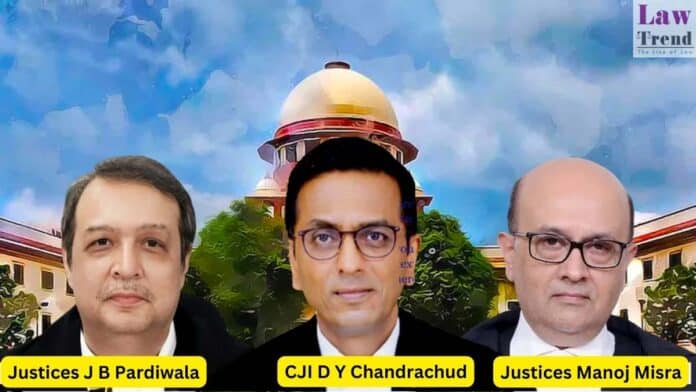In a landmark ruling, the Supreme Court of India today held that officers of the Directorate of Revenue Intelligence (DRI) have the authority to issue show-cause notices and recover duties under the Customs Act, 1962. This decision, which overturns the Court’s 2021 judgment in Canon India Pvt. Ltd. v. Commissioner of Customs, reaffirms that DRI officers are considered “proper officers” under Section 28 of the Act and can exercise jurisdiction to issue show-cause notices.
The decision, delivered by a bench comprising Chief Justice of India DY Chandrachud, and Justice JB Pardiwala and Justice Manoj Misra, validates the powers of not only DRI officers but also other agencies such as the Customs-Preventive Commissionates and the Directorate General of Central Excise Intelligence.
The Court’s Reasoning

Justice Pardiwala, who pronounced the judgment, cited that Canon India had been decided without considering certain critical circulars and notifications. These include:
1. Circular No. 4/99 issued in 1999, which empowered DRI officers to issue show-cause notices under Section 28.
2. Notification No. 44/2011 from 2011, which designated DRI officers as “proper officers” for the purposes of Sections 17 and 28.
The Court held that these documents should have been considered in Canon India, thereby affecting the validity of the earlier judgment. Additionally, the Court underscored that DRI officers had been formally appointed as customs officers through a 1990 notification from the Ministry of Finance, later reinforced by another notification in 2002.
Implications for Pending Cases
The ruling provides clear directions for dealing with ongoing cases across various legal forums:
– High Court Challenges: Writ petitions challenging DRI-initiated show-cause notices will be resolved in line with the current judgment, and the notices will be restored for adjudication.
– Supreme Court Appeals: Appeals pending before the Supreme Court will follow the new judgment, with appellants given eight weeks to submit appeals to the Central Excise and Service Tax Appellate Tribunal (CETSTAT).
– Jurisdictional Objections: Cases questioning the authority of DRI officers based on jurisdiction will be reviewed under the Supreme Court’s latest directions, with relevant time extensions provided for appealing parties.
Background of the Canon India Judgment
The original 2021 judgment in Canon India had ruled that DRI officers did not qualify as “proper officers” under the Customs Act unless the Central Government explicitly delegated them authority under Section 6. The Supreme Court held that only the customs officer who had conducted the initial assessment could issue a show-cause notice under Section 28, effectively limiting the DRI’s enforcement powers.
This precedent led to widespread challenges, with numerous High Courts and tribunals dismissing DRI-initiated proceedings as invalid under Section 28. The Customs Department filed a review petition in response, urging the Supreme Court to reconsider its stance on DRI officers’ powers.
Key Arguments Presented
– Customs Department’s Stance: Additional Solicitor General N. Venkataraman argued for the Customs Department, contending that since 1977, DRI officers have functioned as a specialized class within the Ministry of Finance. He also highlighted several alleged errors in Canon India, asserting that the judgment overlooked established legal provisions and precedents.
– Respondents’ View: Senior advocates representing the respondents opposed the review petition, arguing that Canon India was legally sound and did not warrant reconsideration. They stated that a differing judicial interpretation does not constitute an “apparent error” that justifies a review.







